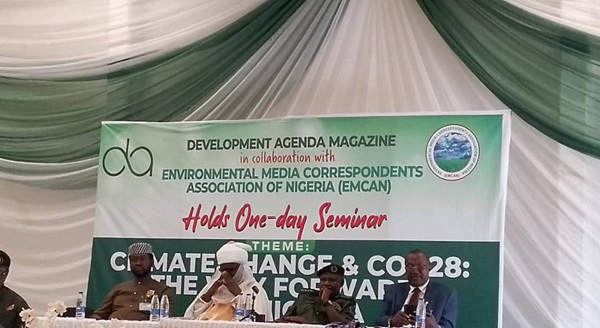
Environmentalists have sounded the alarm over the escalating issue of illegal tree logging contributing to the environmental havoc caused by climate change across Nigeria’s 36 states and the Federal Capital Territory (FCT).
The concern was central to discussions at a one-day seminar organised by the development agenda in collaboration with the Environmental Media Correspondents Association of Nigeria in Abuja.
The seminar, themed “Climate Change and COP28: The Way Forward for Nigeria,” addressed the impending 28th Conference of the Parties (COP28) scheduled in Dubai, United Arab Emirates. The COP28 is expected to draw over 70,000 participants, including heads of state, government officials, international organisation representatives, business leaders, academics and civil society organisations.
During the seminar, the publisher and editor-in-chief of Development Agenda magazine, Mr. Paddy Ezeala expressed his concern about rampant tree logging in various states, including Cross Rivers, Ondo, and Ogun, as well as some North Central states. He lamented the reckless cutting down of trees, contributing to Nigeria’s staggering annual four percent forest loss, the highest globally.
Ezeala highlighted the detrimental impact of illegal logging, citing the presence of a foreign privately-owned charcoal-producing factory in Nsukka, Enugu state, exacerbating the destruction caused by foreigners. He emphasised that Nigeria lost 3.7 million hectares of forests between 1981 and 2000, resulting in a colossal loss of biodiversity. The country’s forest cover has depleted to less than 10 percent, falling short of the Food and Agricultural Organisation’s mandate of maintaining a minimum forest cover of 25 percent of its land area.
The publisher drew attention to the absence of measures encouraging forest regeneration and a valuation system for forest resources. He stressed the need for environmentally and socially equitable approaches to forest management in Nigeria and called for urgent action to curb the wanton destruction of forests nationwide.
Ezeala urged a shift toward harnessing the potential of forests for eco-tourism and scientific research, emphasising the importance of prioritizing tree planting and securing protected areas. He called for support for the National Park Service and other entities managing protected areas.
The Emir of Nasarawa, Alhaji Ibrahim Usman Jibril highlighted environmental challenges, including rising sea levels, climate change, deforestation, drought and desertification. He acknowledged the ban on charcoal but noted the government’s challenge in preventing households from using it without providing alternative fuel sources.
The Conservator-General of the National Parks Service (NPS), Dr. Ibrahim Goni emphasised the significant contribution of national parks to mitigating climate change. He called on the media to publish more stories on climate change and highlighted the delayed establishment of 10 new national parks approved by the Federal Government in 2020.
The chairman of EMCAN, Mr. Chuks Oyema underscored the seminar’s purpose to showcase Nigeria’s efforts in tackling climate change and its preparedness for COP28. He urged the media to increase coverage on climate change and collaborate on collective actions to mitigate its impact on the environment.


